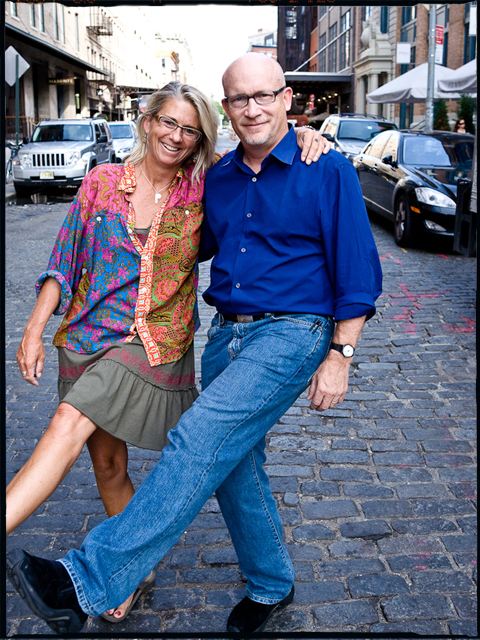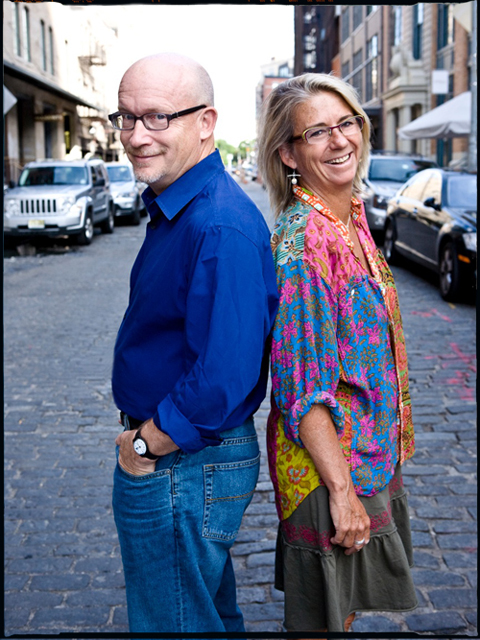Why won't our parents shut up already about the Sixties? Here's your chance to live it for two hours and find out. Directors Alex Gibney and Allison Ellwood have resurrected, cinematically, the pivotal moment when our country went from Mad Men to HAIR.
It was 1964, and Ken Kesey, author of One Flew Over the Cuckoo's Nest, decided to go on a road trip with a like-minded group of renegades called The Merry Pranksters. Merry Prankster Robert Stone, wrote " [The road] embraced risk in an attitude of faith that looked forward to the advancement of everything within us that was nobler, more generous, more just."
So, how did this end up as people living and driving in a bus cross-country, high on LSD?
The truth is, it's far from that simple. Thomas Wolfe's culturally defining book, The Electric Kool-Aid Acid Test, tells the story of this very bus ride. A road trip where a group of kids, and a few icons, coming from a conservative and buttoned-down world, intuitively stumbled on what was to become the sixties.
If you've read the non-fiction book, now you can finally see the non-fiction movie. It took over forty years to get here, but it's here, and in color. Gibney and Ellwood have transformed 100 hours of raw unseen footage into archival verite; using actual film to tell the story. Magic Trip gives you the experience of being part of a huge cultural awakening, rather than being told about it, years later.
We hear the voices and thoughts of the bus visionaries, interviewed by Stanley Tucci, whose subtle irony lends humor and insight to the proceedings.
Neal Cassady, a major figure of the beat generation of the 1950s, drives the bus to New York, and has an important moment in American history. He was "Dean Moriarty" in Jack Keroac's On the Road, written into Alan Ginsberg's Howl, and chronicled in Thomas Wolfe's The Electric Kool-Aid Acid Test.
It is incredible to watch this footage of an iconic figure, after all this time, and Cassady does not disappoint. He is fantastically beautiful, fascinating, and charismatic. Anyone can have these magical qualities in a $200 million film, but it is far more impressive to see them in the video-equivalent of a home movie. Ken Kesey, years later, wrote a fictional account of Cassady's death, called The Day After Superman Died.
In Magic Trip, Cassady stays a kind of beautiful enigma, whom we can't get enough of, even though we hear his voice all the way to New York. And that's saying a lot, because Cassady is high on speed, driving and talking non-stop. Gibney says, " He's almost like a drummer who sets the beat for the film".
Millions who have been inspired by books like On the Road, Howl and Electric Kool-Aid Acid Test, will finally have a chance to get on the bus themselves. And to spend time with the likes of Jerry Garcia, Timothy Leary, Allen Ginsburg, Jack Kerouac and Larry McMurtry. A pretty extraordinary gathering when we consider that the party was on a moving bus so old and rickety that someone yelled to Kesey, "You'll never get that thing past Oklahoma!"
Oscar-winning director Alex Gibney and Emmy-winning director and editor Allison Ellwood talk about re-creating this specific moment in history:
This film is what we would call archival vérité; Did this footage lend itself to this style?
Allison: There's something so lovely about being with young people embarking on the journey of their lives at this particular moment and never stepping out of it. You get on the bus, and you stay on the bus, until you leave the theater.
What did they think they would find once their bus arrived at The World's Fair?
Allison: It was billed as The World of Tomorrow and I think that's what they believed they would find. Ken really believed in America and American progress. But what they found was the world of yesterday.
Kesey was originally a small-town boy, married to his child-hood sweetheart, and was training to wrestle for the Olympics when the government used him in an experiment, introducing him to LSD. LSD may have led to many of his subsequent actions, and the actions of his generation, which the government then found extremely threatening. What do you make of that?
Alex: Economists call that "unintended consequences". (laughter)
Oh, the irony!
Alex: It is very ironic and very funny. LSD prefigured the CIA's use of it, but the idea was in that laboratory that they were trying to control people, and for a while it had just the opposite effect. There was something about this idea, these origins, a darkness born into that culture at the very beginning that would later emerge.
How did you get your hands on the audio-tape of Ken Kesey being given LSD during a government drug trial?
Alex: It was a complete accident. It was in Kesey's barn. I happened upon this box and it said 1960 Veterans Administration Hospital. Think about this: It's 1960, before he wrote Cuckoo's Nest, and here he is being experimented on by this nurse, a big nurse. Administering, we think it is, IT 290, to him. And we're getting to listen to him as he gets his mind expanded.
This is an extraordinarily unusual and wonderful moment in the film. We hear Kesey's voice, and we watch as an ordinary hospital room slowly becomes magical due to the hallucinogens.
Alex: We were so concerned because so many bad LSD trips have been done on film!
(laughs) We wanted this one to be rooted in something real, so that fantasy and reality morph and that you get a sense of reality changing.

Directors Allison Ellwood and Alex Gibney. Portrait by Leslie Hassler.
Why is this moment so pivotal in our history?
Alex: The 60's has become a kind of commodity. It's become a kind of cliché and a stereotype. But when you see people actually inventing the 60's, it's like seeing Dr. Frankenstein in the laboratory! You're seeing these folks along the way, not quite knowing what they're doing. Ken Kesey is already re-conceptualizing and steering it into a myth that would then explode into the 60s. But was what was so great about it, you have to understand, was that the 60's have not happened yet. You can also see the excitement, idealism and wonder of the 60's, but also what was wrong with it: the excess, the waste, the carelessness.
Allison: And you see it all visually happening, for the first time. They create tie-dye in front of you.
If none of this has happened yet, are they discovering all of this from a kind of 50's Mad Men mentality?
Alex: This is the time of the man with the flannel suit and the martini. Everyone is buttoned up. You can see, when they get to New York, a kind of wonder on the faces of the people. The idea of a color-painted bus is very new to them, it's like the most exotic circus has come to town.
They go for a swim on a hot Louisiana day, and realize that they have encroached on a "Colored-Only" beach. What did you think when you saw that?
Alex: It reminds you that not so very long ago in America, we had segregated beaches. It's funny that way, the topsy-turvy aspects of that time. In some ways it was very free, like not needing a driver's license to drive and yet there are some very rigid rules, like race and dress.
Except for 'Stark Naked', (a beautiful girl who keeps taking her clothes off) our film's Angelina Jolie! (laughter) The Police stop the bus many times without any consequences. Do they not realize what they're seeing?
Alex: There was something about that time that was so conservative and what they were doing on the bus was so outrageous, just visually, that no one knew what to make of it. But it wouldn't take long at all before people knew exactly what that meant. Just a few years later, you have the film Easy Rider, and a bus like that means to the authorities, "Take them out".
What about the incredible moment where a policeman stops the bus and they explain their crazy behavior by saying, "Well, we're making a movie", except that they have no film in their camera?
Alex: And he lets them go, they're floating about 8 miles high, and the cop looks at them and basically says, "Everything seems to be in order. There is no valid driver's license, no one's wearing seatbelts, and everyone is as high as a kite. I guess you can be on your way."
Amazing. How did you find the music for your film?
Alex: It was a fascinating time, musically. The Beatles were just coming over to the States that year, 1964. A lot of the tunes we play in the movie are the versions of really well known songs like Love Potion Number 9, or Twist and Shout but they're the original black versions instead of the white covers. They were listening to a lot of jazz on the bus. The beautiful John Coltrane and Duke Ellington piece in the film we got due to our wonderful composer, David Kahne, who got Ravi Coltrane to play for us. So when you hear Greensleeves, that's Ravi Coltrane. (John Coltrane's son, also a Jazz musician)
Even with all of his literary acclaim, Kesey eventually came to believe that this period of his life was his best work. What do you think?
Alex: He contributed to a real cultural moment in history by taking this trip. And it became iconic. Partially, because of the book written by Tom Wolfe, about this time. But also because of the meaning that Kesey gave the trip as it was happening; he's guiding the action like the novelist guides the action of his characters
Allison: He wrote this bus trip into his screenplay version of One Flew Over the Cuckoo's Nest and was summarily fired. (laughter)
What do you think this movie says to us in a post-9/11 world? Is it more than a glimpse into a moment in history?
Alex: In a post-9/11 world, everyone got terribly afraid and allowed themselves to veer away from the wonder and also the high principles that we may have embraced before then. Kesey was attempting to be the antidote to that in a cultural sense.
Do you think that this is a film about a loss of innocence?
Alex: Absolutely, but I think it's also about a group of people who try to recapture innocence. I think they felt that America had descended into a kind of primal fear-- whether it was the bomb or the JFK assassination. Everyone was very uptight and rigid and straight-laced and they wanted to capture a more childlike view of the world. Now, this may have led them their own kind of disillusionment, but that bus was meant to be a kind of permission for all of us to be like children: Come and play, get out of your bomb shelter.
Magic Trip Opens August 5th: http://www.jigsawprods.com/magic-trip/
Magic Trip released by Magnolia Pictures: href="http://www.magpictures.com/profile.aspx?id=3cb4ac16-d0fc-463c-a589-e7ebbbb4f543" target="_hplink">http://www.magpictures.com/profile.aspx?id=3cb4ac16-d0fc-463c-a589-e7ebbbb4f543
For more of photographer Leslie Hassler's work: http://lesliehassler.com/
